Unit 13 We’re trying to save the earth. Section A 1a-1c 课件(共21张PPT)
文档属性
| 名称 | Unit 13 We’re trying to save the earth. Section A 1a-1c 课件(共21张PPT) | 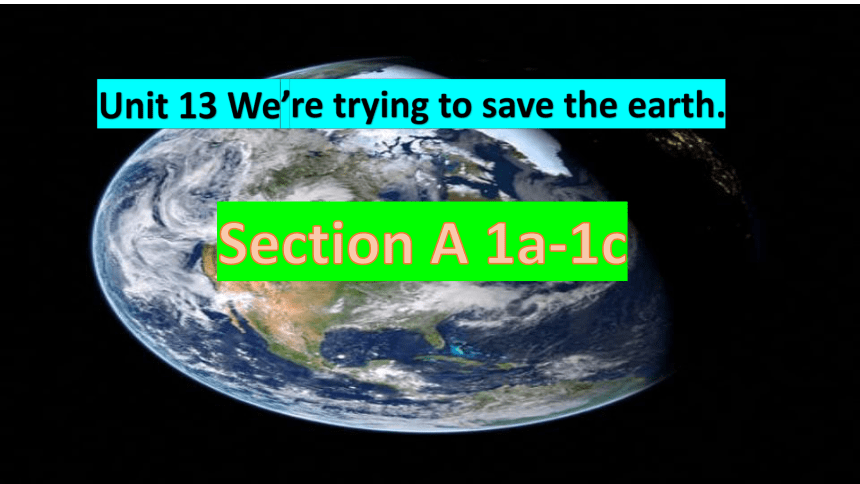 | |
| 格式 | zip | ||
| 文件大小 | 2.1MB | ||
| 资源类型 | 试卷 | ||
| 版本资源 | 人教新目标(Go for it)版 | ||
| 科目 | 英语 | ||
| 更新时间 | 2023-01-05 21:05:18 | ||
图片预览

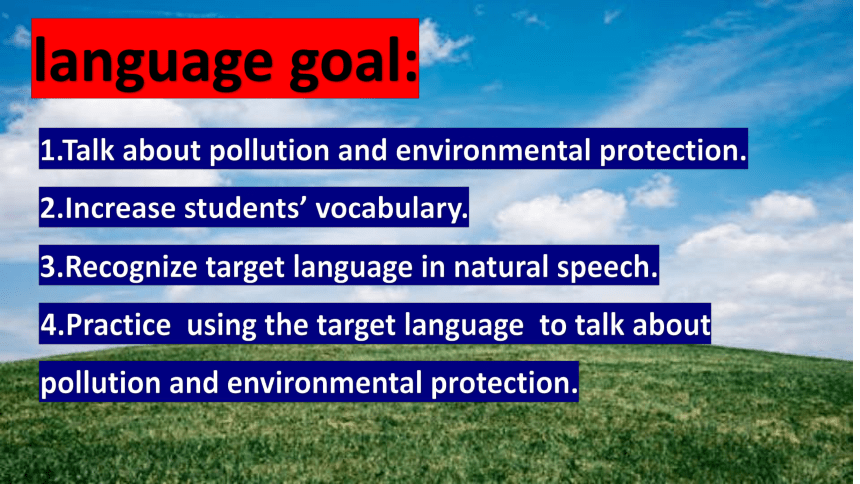
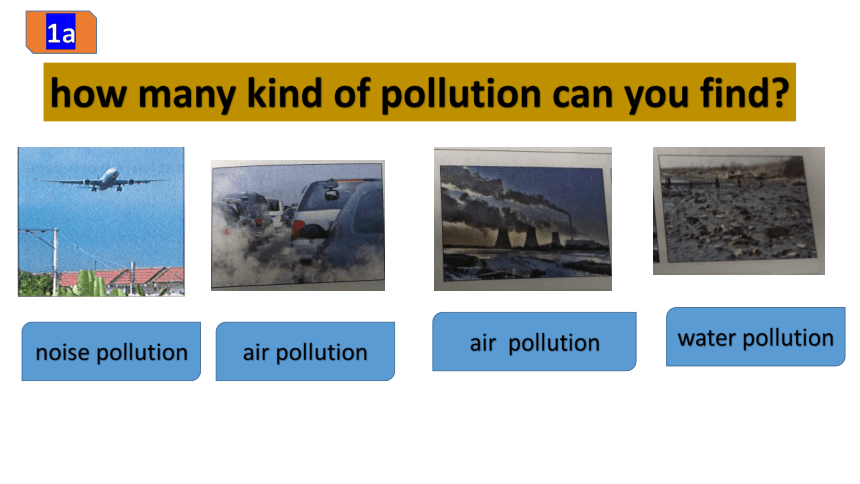
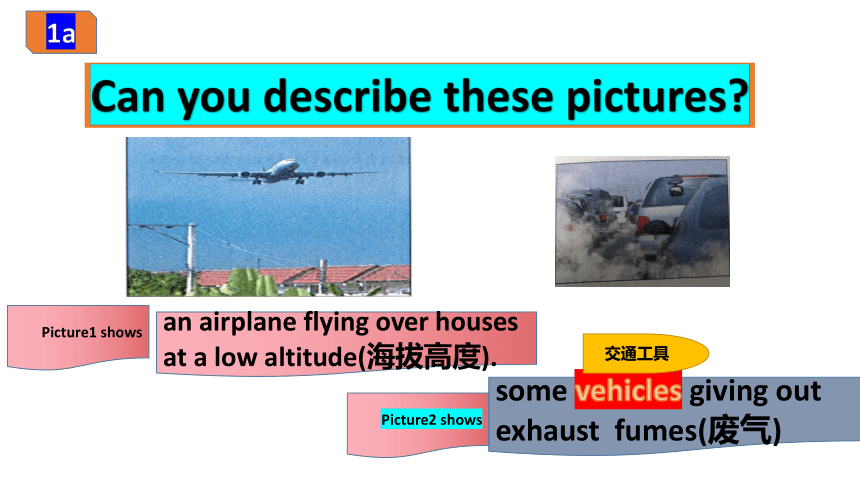
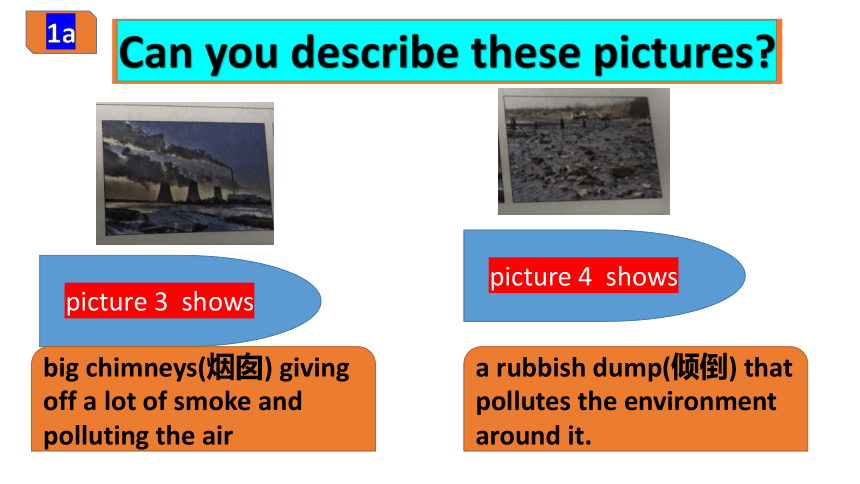
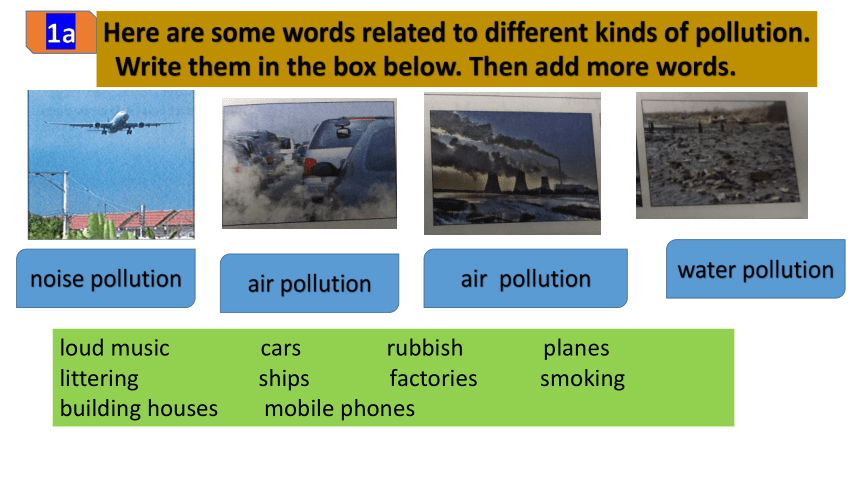
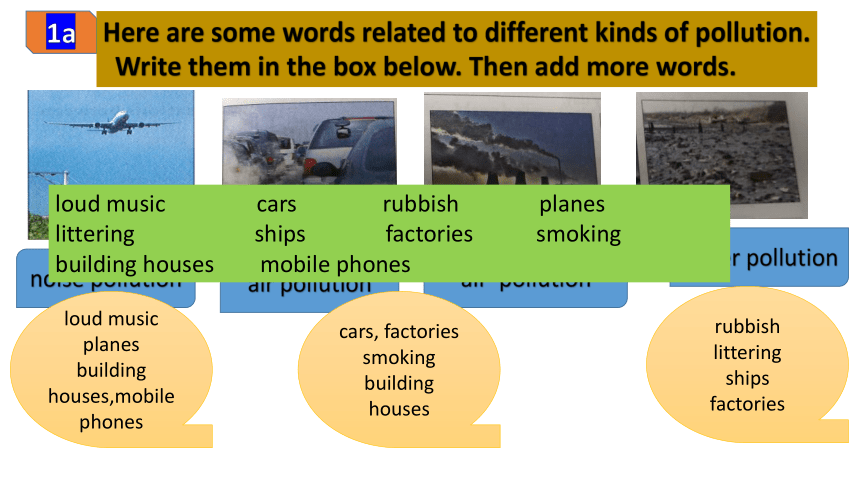
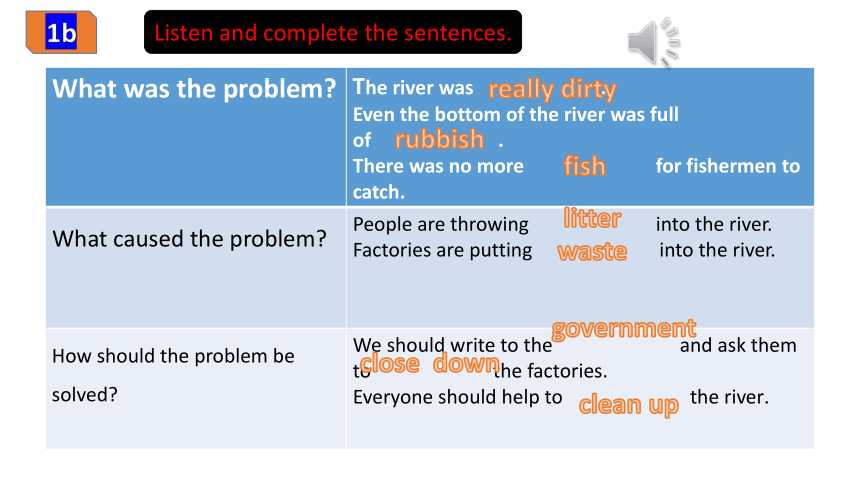
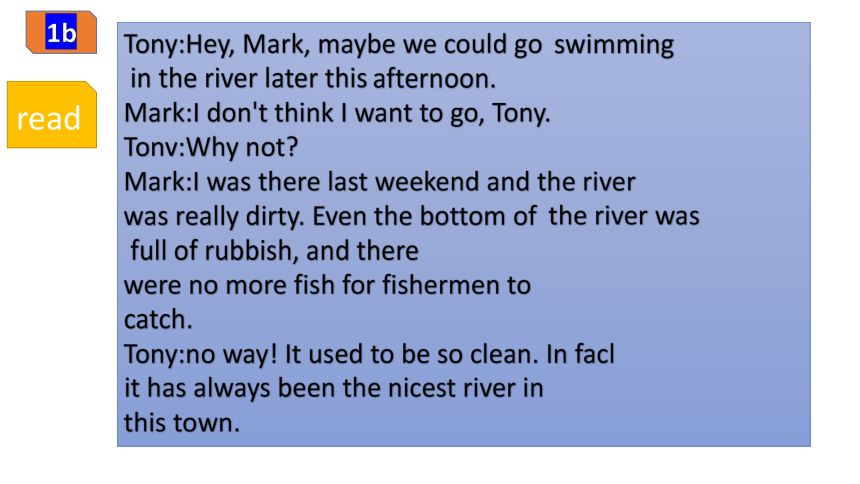
文档简介
(共21张PPT)
Unit 13 We’re trying to save the earth.
Section A 1a-1c
1.Talk about pollution and environmental protection.
2.Increase students’ vocabulary.
3.Recognize target language in natural speech.
4.Practice using the target language to talk about
pollution and environmental protection.
language goal:
1a
how many kind of pollution can you find
noise pollution
air pollution
water pollution
air pollution
1a
Can you describe these pictures
Picture1 shows
an airplane flying over houses at a low altitude(海拔高度).
Picture2 shows
some vehicles giving out exhaust fumes(废气)
交通工具
1a
Can you describe these pictures
picture 3 shows
a rubbish dump(倾倒) that pollutes the environment around it.
picture 4 shows
big chimneys(烟囱) giving off a lot of smoke and polluting the air
1a
Here are some words related to different kinds of pollution.
Write them in the box below. Then add more words.
noise pollution
air pollution
water pollution
air pollution
loud music cars rubbish planes
littering ships factories smoking
building houses mobile phones
1a
Here are some words related to different kinds of pollution.
Write them in the box below. Then add more words.
noise pollution
air pollution
water pollution
air pollution
loud music
planes building houses,mobile phones
cars, factories smoking
building houses
rubbish
littering
ships
factories
loud music cars rubbish planes
littering ships factories smoking
building houses mobile phones
1b
Listen and complete the sentences.
What was the problem The river was .
Even the bottom of the river was full of .
There was no more for fishermen to catch.
What caused the problem People are throwing into the river.
Factories are putting into the river.
How should the problem be solved We should write to the and ask them to the factories.
Everyone should help to the river.
really dirty
rubbish
waste
litter
fish
close down
government
clean up
1b
Tony:Hey, Mark, maybe we could go swimming
in the river later this afternoon.
Mark:I don't think I want to go, Tony.
Tonv:Why not
Mark:I was there last weekend and the river
was really dirty. Even the bottom of the river was
full of rubbish, and there
were no more fish for fishermen to
catch.
Tony:no way! It used to be so clean. In facl
it has always been the nicest river in
this town.
read
1b
Mark: Not anymore. I think people are throwing ltter into the river. Factories are also putting waste into the river.
Tony: That's terrible! We should write to the government. They should close down the factories.
Mark: Good idea! But I think everyone in this town should help to clean up the river, too. Everyone should play a part, not just the government.
read
1c
Role-play the conversation.Then make your own conversations about the kinds of pollution in 1a.
Mark: The river was dirty. Even
the bottom of the river was
full of rubbish.
Tony: But it used to be so clean.
Mark: Yes, but people are
throwing litter into the
river.
Tony: Everyone in this town
should play a part in
cleaning it up.
=be filled with …充满…
类似与play a role in
To preserve the environment and make life sustainable
(可持续的)on our planet, everyone has to work together
to reduce every form of pollution.
保护
降低
Take notes
Take notes
①fish表示同- -种类的鱼时,其单复数同形:
例:a fish -条鱼,two fish两条鱼。
②表示不同种类的鱼时,复数加-es:
例: These are three fishes.这是三种鱼。
③作“鱼肉”讲时,为不可数名词:
例: a piece of fish一块鱼肉。
Take notes
(贵州毕节中考) -Could you please pass me something to eat -What about some_
Water B. orange C. fish D. tea
解析: water“水”; orange "橙子;橘子"; fish "鱼"; tea "茶"。
根据something to eat 可以判断属于吃的东西有orange和fish,
又因为orange 作“橘子”讲时是可数名词,其前有some修饰,
应用复数形式,故只有fish正确。选C。
Take notes
catch the train 赶火车
catch up with赶上
catch a cold感冒
catch动词,意为"抓住”,其第三人称单数
形式为catches,
其过去式为caught。
Take notes
bottom名词,意为”底部;最下部"。
常构成短语at the bottom of....意为”....的底部”",
其反义词组为at the top of意为....顶端..。
例: There's a hole at the bottom of the flower pot.
花盆底部有个洞。
Take notes
used to be”过去是.... ;used to do sth.”过去常常做某事”,
它表示过去存在某种状态或者过去经常性、习惯性的动作,
并意味着这种状态或动作目前已不存在。
例: He used to be an English teacher.
他过去是一名英语老师。
He used to swim in the river when he was a child.
他是一个小孩子的时候,常常在这条河里游泳。
Take notes
litter指四处乱丢的东西和杂物
garbage专指厨房中的残羹剩饭等必须清除的垃圾
rubbish指残骸、废物等普通垃圾,特意集中起来以便清除
waste指任何被丢弃的东西
Take notes
play part意为“参与;在....方面起作用”,后接名词、代词或动词-ing形式。
例: Education can play a part in it.教育可以在其中起作用。
play an active part in (doing) sth.
积极参与(做)某事
play an important part in (doing) sth.
在(做)某事中发挥重要作用
Unit 13 We’re trying to save the earth.
Section A 1a-1c
1.Talk about pollution and environmental protection.
2.Increase students’ vocabulary.
3.Recognize target language in natural speech.
4.Practice using the target language to talk about
pollution and environmental protection.
language goal:
1a
how many kind of pollution can you find
noise pollution
air pollution
water pollution
air pollution
1a
Can you describe these pictures
Picture1 shows
an airplane flying over houses at a low altitude(海拔高度).
Picture2 shows
some vehicles giving out exhaust fumes(废气)
交通工具
1a
Can you describe these pictures
picture 3 shows
a rubbish dump(倾倒) that pollutes the environment around it.
picture 4 shows
big chimneys(烟囱) giving off a lot of smoke and polluting the air
1a
Here are some words related to different kinds of pollution.
Write them in the box below. Then add more words.
noise pollution
air pollution
water pollution
air pollution
loud music cars rubbish planes
littering ships factories smoking
building houses mobile phones
1a
Here are some words related to different kinds of pollution.
Write them in the box below. Then add more words.
noise pollution
air pollution
water pollution
air pollution
loud music
planes building houses,mobile phones
cars, factories smoking
building houses
rubbish
littering
ships
factories
loud music cars rubbish planes
littering ships factories smoking
building houses mobile phones
1b
Listen and complete the sentences.
What was the problem The river was .
Even the bottom of the river was full of .
There was no more for fishermen to catch.
What caused the problem People are throwing into the river.
Factories are putting into the river.
How should the problem be solved We should write to the and ask them to the factories.
Everyone should help to the river.
really dirty
rubbish
waste
litter
fish
close down
government
clean up
1b
Tony:Hey, Mark, maybe we could go swimming
in the river later this afternoon.
Mark:I don't think I want to go, Tony.
Tonv:Why not
Mark:I was there last weekend and the river
was really dirty. Even the bottom of the river was
full of rubbish, and there
were no more fish for fishermen to
catch.
Tony:no way! It used to be so clean. In facl
it has always been the nicest river in
this town.
read
1b
Mark: Not anymore. I think people are throwing ltter into the river. Factories are also putting waste into the river.
Tony: That's terrible! We should write to the government. They should close down the factories.
Mark: Good idea! But I think everyone in this town should help to clean up the river, too. Everyone should play a part, not just the government.
read
1c
Role-play the conversation.Then make your own conversations about the kinds of pollution in 1a.
Mark: The river was dirty. Even
the bottom of the river was
full of rubbish.
Tony: But it used to be so clean.
Mark: Yes, but people are
throwing litter into the
river.
Tony: Everyone in this town
should play a part in
cleaning it up.
=be filled with …充满…
类似与play a role in
To preserve the environment and make life sustainable
(可持续的)on our planet, everyone has to work together
to reduce every form of pollution.
保护
降低
Take notes
Take notes
①fish表示同- -种类的鱼时,其单复数同形:
例:a fish -条鱼,two fish两条鱼。
②表示不同种类的鱼时,复数加-es:
例: These are three fishes.这是三种鱼。
③作“鱼肉”讲时,为不可数名词:
例: a piece of fish一块鱼肉。
Take notes
(贵州毕节中考) -Could you please pass me something to eat -What about some_
Water B. orange C. fish D. tea
解析: water“水”; orange "橙子;橘子"; fish "鱼"; tea "茶"。
根据something to eat 可以判断属于吃的东西有orange和fish,
又因为orange 作“橘子”讲时是可数名词,其前有some修饰,
应用复数形式,故只有fish正确。选C。
Take notes
catch the train 赶火车
catch up with赶上
catch a cold感冒
catch动词,意为"抓住”,其第三人称单数
形式为catches,
其过去式为caught。
Take notes
bottom名词,意为”底部;最下部"。
常构成短语at the bottom of....意为”....的底部”",
其反义词组为at the top of意为....顶端..。
例: There's a hole at the bottom of the flower pot.
花盆底部有个洞。
Take notes
used to be”过去是.... ;used to do sth.”过去常常做某事”,
它表示过去存在某种状态或者过去经常性、习惯性的动作,
并意味着这种状态或动作目前已不存在。
例: He used to be an English teacher.
他过去是一名英语老师。
He used to swim in the river when he was a child.
他是一个小孩子的时候,常常在这条河里游泳。
Take notes
litter指四处乱丢的东西和杂物
garbage专指厨房中的残羹剩饭等必须清除的垃圾
rubbish指残骸、废物等普通垃圾,特意集中起来以便清除
waste指任何被丢弃的东西
Take notes
play part意为“参与;在....方面起作用”,后接名词、代词或动词-ing形式。
例: Education can play a part in it.教育可以在其中起作用。
play an active part in (doing) sth.
积极参与(做)某事
play an important part in (doing) sth.
在(做)某事中发挥重要作用
同课章节目录
- Unit 1 How can we become good learners.
- Section A
- Section B
- Unit 2 I think that mooncakes are delicious!
- Section A
- Section B
- Unit 3 Could you please tell me where the restroom
- Section A
- Section B
- Unit 4 I used to be afraid of the dark.
- Section A
- Section B
- Unit 5 What are the shirts made of?
- Section A
- Section B
- Review of Units 1-5
- Unit 6 When was it invented?
- Section A
- Section B
- Unit 7 Teenagers should be allowed to choose their
- Section A
- Section B
- Unit 8 It must belong to Carla.
- Section A
- Section B
- Unit 9 I like music that I can dance to.
- Section A
- Section B
- Unit 10 You're supposed to shake hands.
- Section A
- Section B
- Review of Units 6-10
- Unit 11 Sad movies make me cry.
- Section A
- Section B
- Unit 12 Life is full of the unexpected
- Section A
- Section B
- Unit 13 We're trying to save the earth!
- Section A
- Section B
- Unit 14 I remember meeting all of you in Grade 7.
- Section A
- Section B
- Review of Units 11-14
